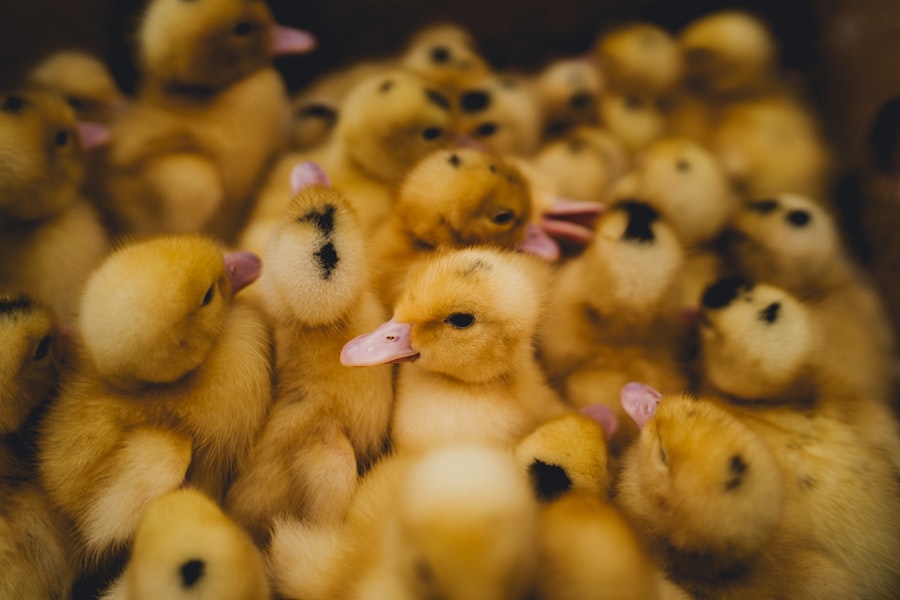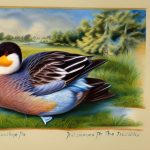Origins of the Aylesbury Duck
The Aylesbury duck, also known as the Aylesbury breed, originated in the town of Aylesbury in Buckinghamshire, England. It is believed that the breed was developed in the 18th century, and it quickly gained popularity due to its white plumage and large size. The Aylesbury duck was primarily bred for its meat and was a common sight in the markets of London during the 19th century. Its popularity continued to grow, and it became a symbol of prosperity and wealth.
Aylesbury Ducks in the United States
The Aylesbury duck was introduced to the United States in the mid-19th century, where it also gained popularity for its meat and eggs. However, with the rise of industrial farming and the demand for faster-growing breeds, the Aylesbury duck faced a decline in numbers. Efforts to preserve the breed have been ongoing, and today, there are dedicated breeders and enthusiasts working to ensure the survival of this historic and iconic duck breed.
Table of Contents
Key Takeaways
- Aylesbury ducks originated in England in the 18th century and were popular for their white plumage and meat quality.
- Breeding Aylesbury ducks involves selecting for white plumage, broad bodies, and orange bills, and providing proper nutrition and housing.
- Caring for Aylesbury ducks includes providing a clean and spacious living environment, access to water for swimming, and a balanced diet.
- Aylesbury ducks are known for their white plumage, orange bills, and large, broad bodies, making them popular for meat production.
- Aylesbury ducks play an important role in agriculture as a source of high-quality meat and eggs, and for their ability to control pests in rice fields.
- Aylesbury duck health and welfare require regular veterinary check-ups, proper nutrition, and protection from predators and harsh weather conditions.
- Breeding challenges for Aylesbury ducks include genetic diversity and maintaining breed standards, which can be addressed through careful selection and breeding programs.
Breeding Aylesbury Ducks
Selecting Breeding Stock
Breeding Aylesbury ducks requires careful selection of breeding stock to ensure the preservation of the breed’s desirable traits. Breeders should look for ducks with pure white plumage, a broad and deep body, and a well-rounded appearance. It is also important to select ducks with good egg-laying abilities and strong maternal instincts. By carefully choosing breeding stock, breeders can help maintain the standard characteristics of the Aylesbury duck breed.
Breeding Practices
Breeding Aylesbury ducks involves providing a suitable environment for mating and egg-laying. Ducks should be given access to clean water for swimming and mating, as well as nesting areas for egg-laying. Breeders should also monitor the health and well-being of their ducks to ensure successful breeding. By following proper breeding practices, breeders can help sustain the population of Aylesbury ducks and contribute to the preservation of this historic breed.
Caring for Aylesbury Ducks
Housing and Environment
Aylesbury ducks require a suitable housing environment that provides protection from predators and the elements. The housing should be spacious enough to allow for natural behaviors such as swimming and foraging. Additionally, ducks should have access to clean water for swimming and drinking, as well as proper ventilation and bedding for comfort. Providing a safe and comfortable environment is essential for the health and well-being of Aylesbury ducks.
Feeding and Nutrition
A balanced diet is crucial for the health and productivity of Aylesbury ducks. Ducks should be provided with a high-quality commercial feed that is specifically formulated for waterfowl. Additionally, ducks can be given access to fresh greens, vegetables, and grains to supplement their diet. It is important to monitor the ducks’ feeding habits and adjust their diet as needed to ensure they receive the necessary nutrients for optimal health and growth.
Aylesbury Duck Characteristics
Physical Appearance
The Aylesbury duck is known for its striking pure white plumage, which sets it apart from other duck breeds. It has a broad and deep body with a well-rounded appearance, giving it a robust and sturdy build. The bill is pinkish in color, and the legs and feet are orange. The Aylesbury duck has a calm and gentle disposition, making it a popular choice for backyard enthusiasts and small-scale farmers.
Egg Production
Aylesbury ducks are known for their excellent egg-laying abilities, making them a valuable dual-purpose breed. They are capable of laying a large number of white eggs throughout the year, making them a reliable source of fresh eggs for consumption or hatching. The eggs are typically larger than those of other duck breeds, making them highly sought after by enthusiasts and small-scale farmers.
The Importance of Aylesbury Ducks in Agriculture
Meat Production
The Aylesbury duck has been historically valued for its high-quality meat, which is known for its tender texture and rich flavor. The breed’s large size and plump body make it an ideal choice for meat production, and it has been a popular choice for culinary purposes for centuries. Aylesbury duck meat is prized for its versatility and is used in a wide range of dishes, from traditional roasts to gourmet preparations.
Conservation Efforts
The Aylesbury duck has faced challenges in modern agriculture due to the rise of industrial farming and the demand for faster-growing breeds. As a result, conservation efforts have been initiated to preserve the breed’s genetic diversity and ensure its survival for future generations. Dedicated breeders and enthusiasts are working to raise awareness about the importance of preserving historic breeds like the Aylesbury duck, and efforts are being made to increase its population and promote its unique qualities.
Aylesbury Duck Health and Welfare

Disease Prevention
Maintaining good health is essential for the welfare of Aylesbury ducks, and disease prevention is a key aspect of their care. Ducks should be provided with regular veterinary care, vaccinations, and parasite control to prevent common diseases and health issues. Additionally, ducks should be housed in clean and sanitary conditions to minimize the risk of illness and promote overall well-being.
Welfare Considerations
Providing for the welfare of Aylesbury ducks involves meeting their physical, behavioral, and social needs. Ducks should have access to clean water for swimming and grooming, as well as ample space for exercise and natural behaviors such as foraging. Additionally, ducks should be provided with protection from predators and adverse weather conditions to ensure their safety and comfort.
Aylesbury Duck Breeding Challenges and Solutions
Genetic Diversity
Maintaining genetic diversity is a significant challenge in breeding Aylesbury ducks, as the breed’s population has declined in recent years. To address this challenge, breeders are working to identify and preserve genetic lines that exhibit desirable traits such as white plumage, large size, and good egg-laying abilities. By carefully selecting breeding stock and implementing breeding programs, efforts are being made to maintain genetic diversity within the Aylesbury duck population.
Market Demand
Meeting market demand for Aylesbury ducks presents a challenge for breeders due to the breed’s slower growth rate compared to commercial meat breeds. To address this challenge, breeders are focusing on promoting the unique qualities of Aylesbury duck meat, such as its superior flavor and texture. By raising awareness about the breed’s culinary value and promoting its heritage status, efforts are being made to increase consumer demand for Aylesbury duck products.
In conclusion, the Aylesbury duck holds a significant place in agricultural history due to its valuable contributions to meat production, egg-laying abilities, and genetic diversity. Efforts to preserve this historic breed are ongoing, with dedicated breeders and enthusiasts working to ensure its survival for future generations. By understanding the history, breeding practices, care requirements, characteristics, importance in agriculture, health considerations, and breeding challenges of Aylesbury ducks, we can appreciate their unique qualities and contribute to their conservation efforts.
If you’re a dedicated Aylesbury duck breeder, you understand the importance of providing a comfortable and secure environment for your flock. Ensuring the right coop size and design is crucial for their well-being. Poultry Wizard offers valuable insights on chicken coop door size and turning a shed into a chicken coop, which can be beneficial for duck breeders as well. Check out their article on chicken coop door size to learn more about creating the ideal living space for your ducks.
FAQs
What is an Aylesbury duck breeder?
An Aylesbury duck breeder is a person or business that specializes in breeding and raising Aylesbury ducks, a breed known for its white plumage and large size.
What is the purpose of breeding Aylesbury ducks?
The purpose of breeding Aylesbury ducks is primarily for their meat. Aylesbury ducks are known for their tender, succulent meat and are often raised for culinary purposes.
What are the characteristics of Aylesbury ducks?
Aylesbury ducks are known for their white plumage, orange bill and legs, and large size. They have a calm and friendly temperament, making them popular for both meat production and as pets.
What does a typical Aylesbury duck breeder do?
A typical Aylesbury duck breeder will raise and care for Aylesbury ducks, ensuring they have proper housing, nutrition, and healthcare. They may also breed the ducks to produce offspring for sale.
Where can I find Aylesbury duck breeders?
Aylesbury duck breeders can be found through online directories, agricultural fairs, and poultry shows. It is important to research and choose a reputable breeder with a good track record of raising healthy ducks.
Meet Walter, the feathered-friend fanatic of Florida! Nestled in the sunshine state, Walter struts through life with his feathered companions, clucking his way to happiness. With a coop that’s fancier than a five-star hotel, he’s the Don Juan of the chicken world. When he’s not teaching his hens to do the cha-cha, you’ll find him in a heated debate with his prized rooster, Sir Clucks-a-Lot. Walter’s poultry passion is no yolk; he’s the sunny-side-up guy you never knew you needed in your flock of friends!







